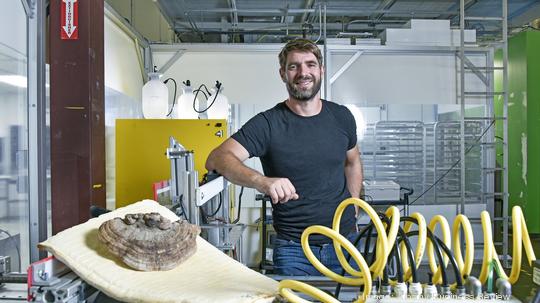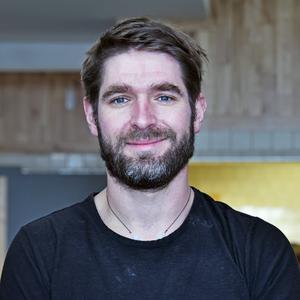
Eben Bayer has spent the past 13 years trying to convince the world that mycelium is the solution to sustainable alternatives for a wide variety of products. And it seems he’s been getting that message across successfully, because he recently raised $100 million to build new factories that can help his companies, Ecovative Design and Atlast Food Co., expand production.
Ecovative has created different strains of mycelium — the rootlike structure of mushrooms — that can be used to make packaging materials and the company is working on developing textile alternatives.
It’s also found a strain that can be used to make vegan meat, the basis for the vegan bacon that the spinoff Atlast is producing.
Had you always wanted to be an entrepreneur? I would say from a very young age, I always dreamed of being an inventor specifically. I imagined maybe having a lab and I thought I’d invent mechanical electrical things. When I got to Rensselaer and met Burt Swersey, he taught me all about entrepreneurship. I’ve later realized that growing up on a small farm in Vermont is the ultimate lesson in entrepreneurship.
It was like a year into my education that two things happened. I was, in my bones, missing Vermont and missing being in nature, and I was reading “Cradle to Cradle” by Bill McDonough, who is sort of the grandfather of the entire sustainability movement we’re now living in. I had this epiphany that biology is the best technology on Spaceship Earth, not computers, not machines.
How did that translate into believing you could use mycelium to make products? I’m an intensely visual learner. I’d seen mycelial fibers growing through wood chips, and I was aware of their structural properties. I was reading chemistry textbooks around plastic insulation that described how plastic polymers act as glues to bind fibers together. In my head, I had a picture of how polymer science was occurring. And I had a picture of how muscle fibers grew, and even though they happen over very different time scales and biologies, I thought they could be the same thing. So that was a picture in my head, and I’ve been chasing that picture for a while now.
What’s been your experience going from a two-person team with co-founder Gavin McIntyre to becoming the boss of 100 employees? I’ve had the opportunity to do this for quite a while and make a ton of mistakes, and I’ve tried really hard to integrate my learnings. I try as a boss to be much more of a supporter and a coach for my team, and the reason the team’s there is to listen to them. My focus at this point as a leader is basically to help people compensate for their weaknesses and play to their strengths.
Startup founders often don’t stay in the CEO role. Why did you choose to? I would actually prefer to be just doing the technical technology and the manufacturing and the product. I enjoy seeing the products that solve problems in the world come to be, and what I learned is that the best chance of those things coming to maximum fruition is best served by me being in this role today. And so that’s why I’m in the role of CEO of Ecovative. It’s also why I’m the CEO of Atlast. I hope one day that might change, but for now, it’s definitely where I can provide the most value to the organization.
Was there ever a point when you wanted to leave and get a job? I was actually joking a couple months ago that I think I’m probably at this point terminally unemployable. But there were lots of times over the last 13 or 14 years that I was ready to quit. And I think my attitude has been: I will quit when there are no more choices, when there are no more options left. Because otherwise, it’s my job to see this through.
And you started making a profit around 2013? Yes, starting in 2013 through 2018. We drove the company to profitability through a mixture of manufacturing, licensing and, candidly, belt tightening. We won’t be profitable this year — we just raised a ton of capital and are spending it as fast as possible to build new factories.
You said a while ago that you weren’t planning an exit for Ecovative. Has that changed at all? If we want to achieve our goals around scalability, which we have because we believe that mycelium at scale has positive planetary impact, we have to create a great business, because that’s what drives the capital. Ultimately, there must be a valuation event. That doesn’t necessarily have to be Ecovative going public or acquiring. Atlast Food Co. is a great example of this. It spun out of Ecovative to take the technology we developed around mycelium and just apply it to the food sector. Atlast could go IPO; it could be acquired; it could be a massively profitable, cash-flow generating [enterprise] that Ecovative is a partial shareholder in. Atlast going public is a monetization event for Ecovative. With that said, it may make sense in the next five-year cycle for Ecovative to IPO. We’ll do that if and when the time’s right.
What’s a big lesson you’ve learned about fundraising? I would say the best thing you can do in fundraising is raise money for something that is aligned with the cultural zeitgeist. That’s it. Everything else beneath that is tactics. What I mean by that is: There are certain things that are hot. Biology as technology is hot. We happen to have built possibly one of the greatest companies in that sector, from a technological basis, over the past 13 years due to this relentless tenaciousness, but it was not hot when we were doing it.
Interview has been edited and condensed
Title: Co-founder and CEO
Organization: Ecovative Design and Atlast Food Co.
Age: 36
Grew up: South Royalton, Vermont
Resides: Troy
Education: Dual bachelor’s degrees in mechanical engineering and design, Rensselaer Polytechnic Institute



